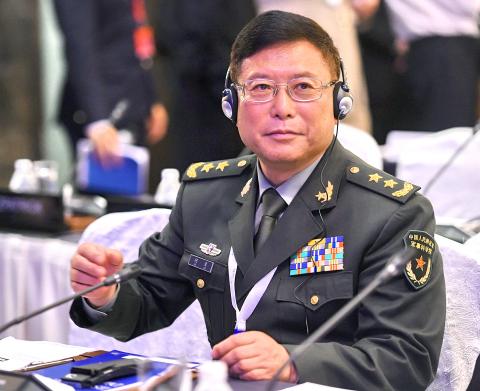Several Asian nations are seeking to bolster informal alliances among themselves, regional diplomats and officials said, unsettled by growing fears that the US could not be relied on to maintain a buffer against China’s assertiveness.
Countries including Australia, Japan, India and Vietnam are quietly stepping up discussions and co-operation, although taking care they do not upset Beijing, the diplomats said.
No one was yet talking about a formal alliance.

PHOTO: AFP
Inaugurating the weekend Shangri-La Dialogue, the region’s premier security forum, Australian Prime Minister Malcolm Turnbull said: “In this brave new world we cannot rely on great powers to safeguard our interests.”
“We have to take responsibility for our own security and prosperity while recognizing we are stronger when sharing the burden of collective leadership with trusted partners and friends,” he said.
His comments resonated through the three-day meeting that ended yesterday.
US Secretary of Defense Jim Mattis told the Singapore forum that Washington remained committed to the region and insisted it would oppose China’s militarization of the disputed South China Sea, one of Asia’s most volatile hot spots.
Regional officials said they were worried by US President Donald Trump’s unpredictability and concerned that his warm praise of Chinese President Xi Jinping (習近平) after their first summit meeting in April would influence decisions on Asia.
“We trust Mattis and we trust [US Pacific Commander Admiral Harry] Harris but at the very top? The trust gap is very wide,” one senior Asian military officer said. “Our fear is driven by the reality that it is only the US that is powerful enough to set red lines with China.”
In broad terms, Singaporean Minister of Defense Ng Eng Hen (黃永宏) confirmed accelerated co-operation among partners, but he also said he welcomed Mattis’ reassurances.
“Countries look at the landscape and you adjust, and that’s what good leadership does ... you put yourself in a position so if there are changes, you are not caught completely off-guard,” Ng said at a news conference yesterday.
Australia, New Zealand, Britain, Malaysia and Singapore re-energised their Five Powers Defence Agreement on the weekend, with officials saying they wanted to better link new military capabilities, as well as boost counter-terrorism efforts and maritime security.
Beijing sent a low-key delegation to the Shangri-La forum this year, but its officials were warily watching developments and warning of “Cold War thinking” behind moves to strengthen alliances.
“It’s a Cold War mentality to use alliances to check on China,” said Senior Colonel Zhao Xiaozhuo (趙小卓), of the People’s Liberation Army’s Academy of Military Science. “It’s creating some sort of threat and using China as a threat is a huge mistake.”

The Taiwanese passport ranked 33rd in a global listing of passports by convenience this month, rising three places from last month’s ranking, but matching its position in January last year. The Henley Passport Index, an international ranking of passports by the number of designations its holder can travel to without a visa, showed that the Taiwan passport enables holders to travel to 139 countries and territories without a visa. Singapore’s passport was ranked the most powerful with visa-free access to 192 destinations out of 227, according to the index published on Tuesday by UK-based migration investment consultancy firm Henley and Partners. Japan’s and

NATIONAL SECURITY THREAT: An official said that Guan Guan’s comments had gone beyond the threshold of free speech, as she advocated for the destruction of the ROC China-born media influencer Guan Guan’s (關關) residency permit has been revoked for repeatedly posting pro-China content that threatens national security, the National Immigration Agency said yesterday. Guan Guan has said many controversial things in her videos posted to Douyin (抖音), including “the red flag will soon be painted all over Taiwan” and “Taiwan is an inseparable part of China,” while expressing hope for expedited “reunification.” The agency received multiple reports alleging that Guan Guan had advocated for armed reunification last year. After investigating, the agency last month issued a notice requiring her to appear and account for her actions. Guan Guan appeared as required,

Japan and the Philippines yesterday signed a defense pact that would allow the tax-free provision of ammunition, fuel, food and other necessities when their forces stage joint training to boost deterrence against China’s growing aggression in the region and to bolster their preparation for natural disasters. Japan has faced increasing political, trade and security tensions with China, which was angered by Japanese Prime Minister Sanae Takaichi’s remark that a Chinese attack on Taiwan would be a survival-threatening situation for Japan, triggering a military response. Japan and the Philippines have also had separate territorial conflicts with Beijing in the East and South China

A strong cold air mass is expected to arrive tonight, bringing a change in weather and a drop in temperature, the Central Weather Administration (CWA) said. The coldest time would be early on Thursday morning, with temperatures in some areas dipping as low as 8°C, it said. Daytime highs yesterday were 22°C to 24°C in northern and eastern Taiwan, and about 25°C to 28°C in the central and southern regions, it said. However, nighttime lows would dip to about 15°C to 16°C in central and northern Taiwan as well as the northeast, and 17°C to 19°C elsewhere, it said. Tropical Storm Nokaen, currently